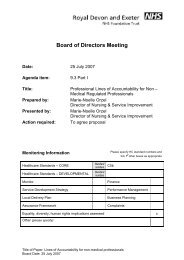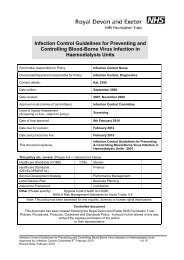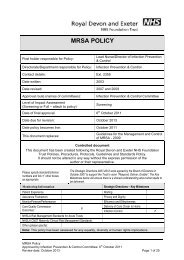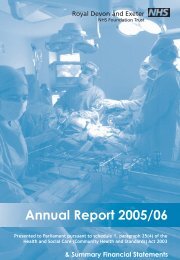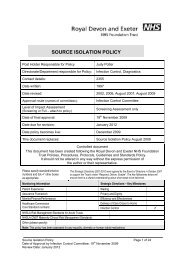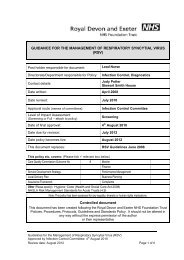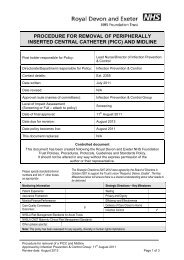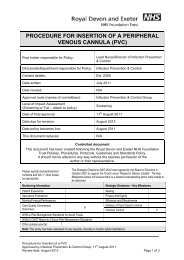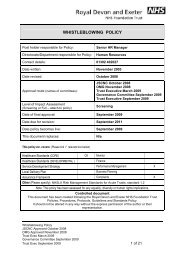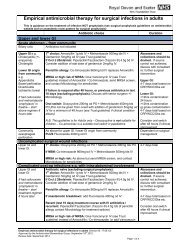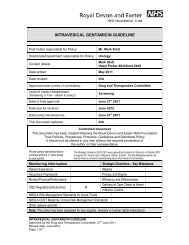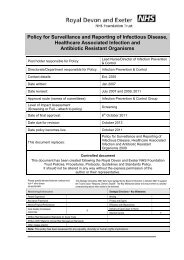Annual Report and Accounts 2012/13 - Royal Devon & Exeter Hospital
Annual Report and Accounts 2012/13 - Royal Devon & Exeter Hospital
Annual Report and Accounts 2012/13 - Royal Devon & Exeter Hospital
You also want an ePaper? Increase the reach of your titles
YUMPU automatically turns print PDFs into web optimized ePapers that Google loves.
38<br />
2. Our Trust <strong>Royal</strong> <strong>Devon</strong> <strong>and</strong> <strong>Exeter</strong> NHS Foundation Trust<br />
<strong>Annual</strong> <strong>Report</strong> <strong>and</strong> <strong>Accounts</strong> <strong>2012</strong>/<strong>13</strong><br />
Frail <strong>and</strong> older<br />
people<br />
As people get older they can develop<br />
complex physical <strong>and</strong> mental health<br />
issues, with social care needs which<br />
are often compounded by isolation<br />
<strong>and</strong> discrimination. <strong>Hospital</strong>isation<br />
entails greater risks for elderly<br />
people, who are more prone to<br />
hospital-acquired infections, falls <strong>and</strong><br />
delirium, <strong>and</strong> can become rapidly<br />
dependent <strong>and</strong> institutionalised. It<br />
also means added pressure on<br />
acute hospitals.<br />
• Frail older patients have<br />
longer admissions<br />
• High occupancy of inpatient<br />
beds has a knock-on impact on<br />
the flow of patients through<br />
the hospital from admission to<br />
discharge <strong>and</strong> this can result<br />
in the cancellation of elective<br />
admissions<br />
• Patients are more likely to<br />
be transferred to the wrong<br />
wards.<br />
A recent King’s Fund report on elderly<br />
care suggests that elderly patients<br />
occupying between 42-55% of bed<br />
days would be better treated at home.<br />
The population served by the RD&E<br />
has a significant proportion of<br />
elderly frail people, above that of the<br />
national average. In one part of East<br />
<strong>Devon</strong>, for example, a demographical<br />
analysis shows that over 80s make up<br />
5.28% of the population, which is<br />
the same as what Engl<strong>and</strong> as a whole<br />
will be like in 2042. Despite these<br />
pressures, caring for elderly people<br />
costs more than the funding received,<br />
<strong>and</strong> this pressure is likely to get<br />
worse within a constrained funding<br />
environment. Added to this is the<br />
fact that reduced social care spending<br />
per capita in <strong>Devon</strong> is lower than<br />
the national average <strong>and</strong> focused on<br />
institutionalised care, <strong>and</strong> that the<br />
system for managing the care of the<br />
elderly is fragmented. The challenge<br />
of managing the health needs <strong>and</strong><br />
expectations of this population are<br />
significant now <strong>and</strong> will become<br />
more so in the future.<br />
Meeting this challenge is a key<br />
element of the Trust's strategy <strong>and</strong><br />
over the last year we have been<br />
working on what we can do to<br />
turn this challenge into a strategic<br />
opportunity. Over time, the Board’s<br />
aspiration is to develop a new,<br />
innovative model of care, working<br />
with our partners to ensure that<br />
frail elderly patients receive the best<br />
possible care <strong>and</strong> the Trust becomes<br />
renowned as a centre of excellence.<br />
We have undertaken a detailed<br />
analysis of the pathways that patients<br />
follow <strong>and</strong> this has helped identify a<br />
number of improvements that would<br />
have the biggest impact on frail older<br />
patients including:<br />
• Providing comprehensive<br />
needs assessment at the<br />
point of presentation to acute<br />
hospital<br />
• Providing active treatment<br />
by health <strong>and</strong> social care<br />
professionals in the patient’s<br />
home for a maximum period<br />
of 21 days as an alternative<br />
to hospital admission in pilot<br />
areas<br />
• Providing education <strong>and</strong><br />
training in dementia care<br />
across the Trust<br />
• Involving patients <strong>and</strong> carers<br />
in our redesign work.<br />
This project has three key str<strong>and</strong>s:<br />
• Changing the way we manage<br />
the care of elderly patients<br />
within the Trust including<br />
new ward arrangements,<br />
active rehabilitation, increased<br />
ambulatory care, 7/7 working,<br />
improving discharge processes<br />
<strong>and</strong> dementia screening<br />
• Working with key partners<br />
including improved early<br />
detection <strong>and</strong> intervention<br />
for dementia, rapid patient<br />
assessments <strong>and</strong> partnership<br />
working with primary care<br />
clinicians<br />
• Potential commissioning<br />
changes: underst<strong>and</strong>ing<br />
<strong>and</strong> discussing with new<br />
commissioners how potential<br />
changes in commissioning<br />
may impact on elderly care.<br />
As a result of this ongoing work,<br />
while admissions for this group of<br />
patients continue to rise, the length<br />
of stay has decreased.



